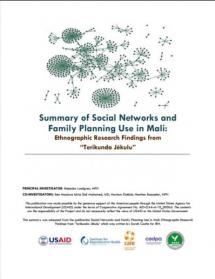Summary of Social Networks and Family Planning Use in Mali
The objective of the ethnographic research was to look at the spread of influence and family planning information through social networks in order to evaluate the role of social networks in facilitating or hindering family planning acquisition and use. The results of the ethnographic research also served to guide the development of data collection tools that were appropriate in the Malian context for the social network mapping, the second part of the formative research.
Source: Institute for Reproductive Health/Georgetown
Date of Publication: March 25, 2019
SIMILIAR RESOURCES
Tools
Examples
- Reaching First-Time Parents and Young Married Women for Healthy Timing and Spacing of Pregnancies in Burkina Faso
- HTSP Project Briefs: Niger, Togo
- HTSP 101: Everything You Want to Know About Healthy Timing and Spacing of Pregnancy
- How-To Guide for a Social Network Diffusion Intervention to Overcome Social Barriers to Family Planning
- Suaahara Training Guidelines and Participant Handbooks
- HTSP Changes Lives
- Family Planning Counselling Kit
- The HTSP Implementation Kit
- Accelerator Behaviors
- The Behavior Change Framework
- Using Network Analysis to Address Unmet Need in Mali
- Topline Results of Rapid Assessment of Barriers to Family Planning Use
- Tékponon Jikuagou Pilot Results
- Baseline Household Survey Report Tékponon Jikuagou Project
- Women’s Social Networks, Family Planning Use and Unmet Need: Formative Research Findings from Terikunda Jékulu

